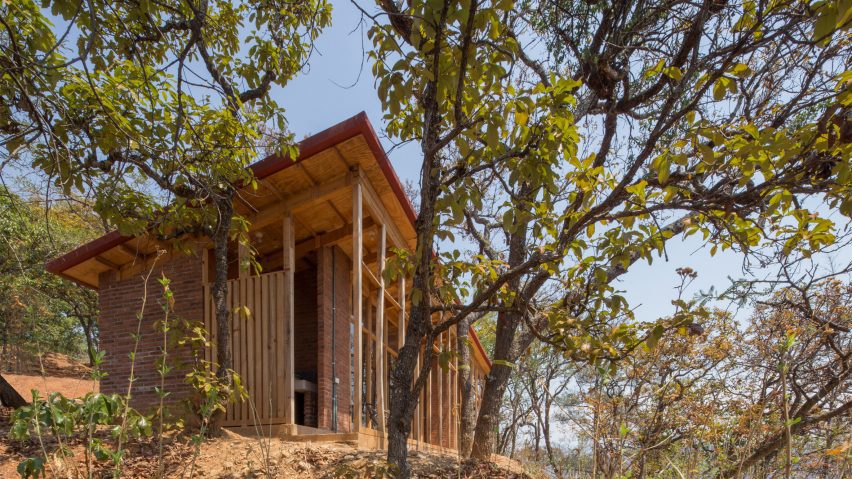Mexico City-based architect Manuel Cervantes Estudio has designed DIY housing that relies on passive, vernacular construction strategies to "help families build their living spaces in a better and smarter way."
Completed in 2022, Rural Nicolas Housing is a continuation of Manuel Cervantes Estudio's "assisted self-production" in Mexico.
"We design manuals so people can understand a better way to build things," the team explained. "We can assist them via pictures on the cell phone and verbal assistance."
The studio analyzes both the physical context of the site and the economic situation, demonstrating to the client the tangible and intangible influences that affect a project.
A prototype of the project, Rural Nicolas Housing is set in a wooded, mountainous environment, so the design maximizes panoramic views and the location's warm, temperate climate with a south orientation, cross ventilation and a slanted shed roof that raises up on the southern side.
"One of the prerogatives that we have sought in these assisted self-production exercises is the bioclimatic optimization of homes, based on their optimal orientation, openings for sunlight to the south, insulating materials to the north, which allow indoor or outdoor spaces to be occupied according to the different times that generate this climate," the studio said.
The 70-square meter (755-square foot) rectangular house is organized in three blocks.
Two bedrooms and a bathroom are collected on one end of the house, and the open-plan living, dining and kitchen area form the centre.
A separate storage and laundry area form the other edge of the house, connected by a narrow portico.
The portico connects to an open recreation platform that integrates exterior space and the interior through glazing and draws in sunlight and heat during the winter.
The glazed corridor and portico act as an occupiable trombe wall.
The house is constructed in vertical bays that form a repetitive pattern along the long facades.
The brick and timber framing – constructed by nailing smaller dimensioned lumber together, rather than sourcing heavy timber – works on a flexible system that can be scaled to adjust to program or budget.
The house uses only a small amount of concrete for the floor slab and brick mortar and has minimal finish outs, using the exposed structural materials as the interior finishes.
The materials were selected because they were both affordable and effective. The system prioritizes materials that are already on hand, and could be sourced locally or acquired through donations.
The studio explained that the architecture and design industry can be very rigid for clients, but families are "searching for life rather than design." And that while challenging, minimizing budget and reducing materials that need long-term maintenance is better for families.
Formerly known as CC Arquitectos, Manuel Cervantes Estudio has completed a number of projects in Mexico. A similar timber framed roof appears in the studio's slope-roofed Santana House, as well as in Cervantes' personal home and studio showroom.
The photography is by Alber Studio.
Project credits:
Architecture: Manuel Cervante Estudio, Manuel Cervantes Céspedes, José Luis Heredia

